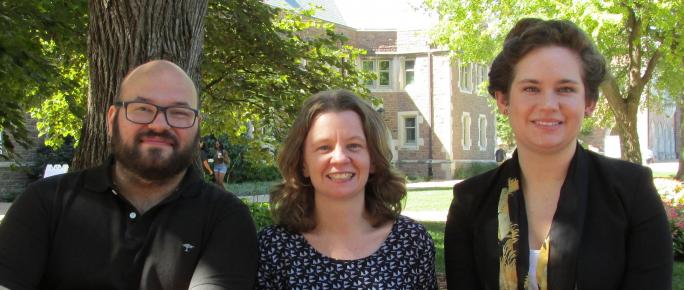
We are delighted to announce that this fall will join the Religious Studies Program. All three bring energy and critical areas of expertise to our course offerings as well as to our intellectual life.
Bialek, lecturer, received her PhD from Brown University in 2015 where she taught for one year as Visiting Assistant Professor in the Religion and Critical Thought program. Her research delves deeply into the intersections of political theory, ethics, and religious thought, and her recent work focuses on contemporary Christian and philosophical approaches to interpersonal relationships marked by love, valuing, and care, or their absence. A prizewinning teacher at Brown, she has also received numerous fellowships and accolades for her scholarship. She will be teaching “Thinking About Religion” and a freshman seminar on Vulnerability this fall.
Gibbons, joint lecturer in Religious Studies and Classics, joins us from Wilfrid Laurier University, where she has taught in the Department of Religion and Culture and the Department of Philosophy. She received her PhD from the Centre for the Study of Religion at the University of Toronto in 2011. Her monograph, The Moral Psychology of Clement of Alexandria: Mosaic Philosophy, will be published by Routledge in September, and explores Clement’s engagement with ancient philosophical debates in the context of his theorization of the Mosaic law. Gibbons’ other work explores how early Christian participation in philosophical argumentation intersected with discussions of astrology, ethnography, and asceticism. This fall she will be teaching Plato’s Apology and “Magicians, Healers and Holy Men” for Classics, and “Introduction to the New Testament” for Religious Studies.
Zürn earned his PhD in pre-modern Chinese religions from the University of Wisconsin-Madison in 2016, and taught for seven years at Grinnell College and in the University of Wisconsin system before coming to Wash U. His research concerns itself with the many ways that religious texts, or scriptures, function in the life of communities, and shows how early Daoists and Buddhists used scriptures not just as philosophical guides, but also as aesthetic and ritual entities that engaged with bodies and other objects in numerous ways. His teaching interests include life, death, and the afterlife in eastern religious systems, and understandings of sex, the body and gender. He will be teaching “Buddhist Traditions: Taking Refuge in the Buddha” this fall.




